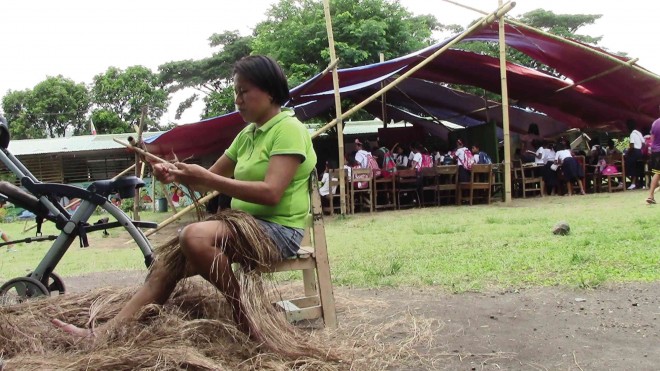Lives disrupted as wait for eruption drags

LIFE GOES ON A woman finds comfort in making handicraft products while classes go on at an evacuation center in Camalig town, Albay province. MICHAEL B. JAUCIAN
ALBAY, Philippines—Slowly and meticulously, nurse Shiela Flores removed the tourniquet from one of the young patients in an evacuation center in Guinobatan town, Albay province, late Monday afternoon. She stared at the rashes of the child, probably her 50th time to do it that day.
Flores, 38, is one of the six nurses at Maninila Elementary School, which serves as home to 434 families or 1,517 people who moved out of their houses in anticipation of Mayon Volcano’s eruption. She has been in the shelter for one month since the alert level over Mayon was raised on Sept. 15.
The alert level prompted the evacuation of 12,712 families or 54,693 people from the towns of Guinobatan, Malilipot, Camalig, Daraga and Sto. Domingo, and the cities of Ligao and Tabaco.
“I wish this would come to an end; it has already dragged on for too long,” she said as her eight-hour daily shift, started at 8 a.m., ended, but she had yet to fetch her youngest child from school.
Article continues after this advertisement
40-50 patients a day
Article continues after this advertisementThe nurses fielded by the Department of Health office in Bicol are on duty from Monday to Saturday noon, caring for 40 to 50 patients every day. The evacuees were suffering from colds, difficulty in breathing, fever or rashes; some were suspected dengue cases.
Imelda Villaceran, 60, a midwife of the rural health unit of Guinobatan, has already referred two deliveries to the hospital during the past month. She is monitoring five other pregnant women.
May Ann Palerno, 22, a municipal social worker under the Office of Senior Citizen Affairs of the Department of Social Welfare and Development, said she and most of the day workers had been stressed out due to the big number of people under their care.
The barangay chair of Maninila and caretaker of the displaced residents, Elmer Nate, works with the social workers to ensure that all evacuees in the center have been accounted for.
Logbook
“We sometimes permit them to come home to take care of their farms and animals they left behind but we always make sure that they return here for their safety,” Nate, 32, said. He keeps a logbook of all evacuees to track down those who leave and return.
“It’s tiring, really. We have to mind this big group for longer than we have ever experienced,” Palerno said.
Maureen Gubot, 38, a Grade 2 teacher, also wished that the alert level on Mayon would be lifted so she and her colleagues need not work through a night shift as guardians and managers of the evacuation center.
Her 9-year-old daughter, Sheri, is already complaining of her having to stay in the school on Tuesday nights after her afternoon classes, she said. The night duty sometimes get in the way of her duties as mother to three children.
Ma. Lizel Opeña, 39, who handles a Grade 4 class, also stays through the night, from 9 p.m. to 6 a.m., on Thursdays. She said she would be paid with “service credit” or paid leave or absences as advised by the school board.
Before she reports for her night duty after her classes during the day, Opeña sees to it that her three children—aged 11, 12 and 5—have been fed and asleep. “Sometimes, I bring my youngest daughter Aira with me… because she misses me,” she said.
New class sked
On her night shift, nurse Krizzia Lanceras, 26, of the Albay Health Emergency Management, serves an average of 12 patients. She said she had to leave her 1-year-old baby to a nanny every time she reports to the evacuation center.
“It broke my heart when the nanny said he cries upon waking up when I had to report for four nights straight,” she said.
Bella Colico, the school principal and camp manager, said the schedule of classes had been revised to accommodate the evacuees in 37 of the classrooms. Some of her teachers have to teach to more than 70 students after classes in the same grade were merged, she said.
“It’s a bit of a toll for us mothers because our children sometimes feel jealous. They sometimes ask me not to report to night shift so I could sleep with them,” Gubot said.
Flores said she was glad she was on the day shift so her children would not have to feel alone at night without her. “But this is something we just have to do. It is a part of our job,” she said.